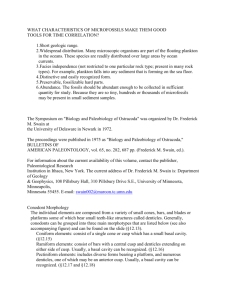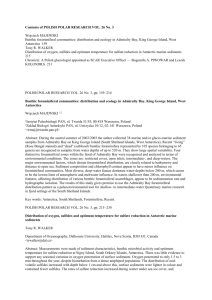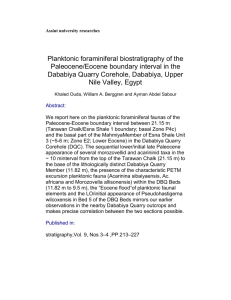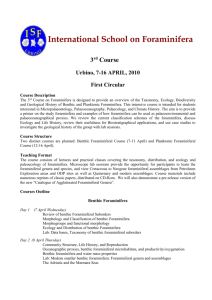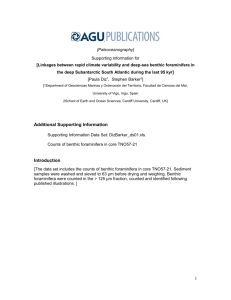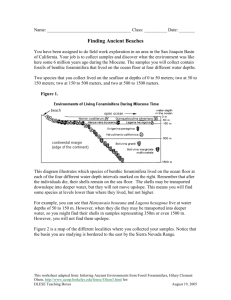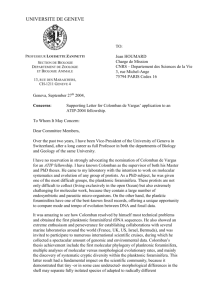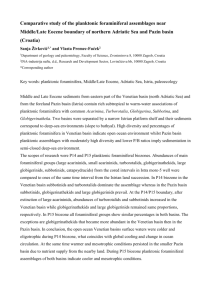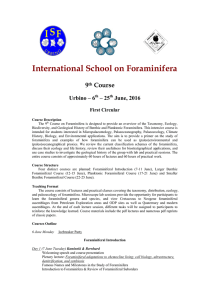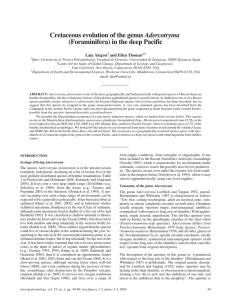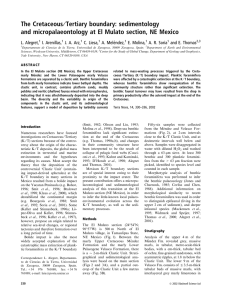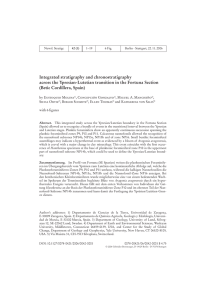Preliminary Oral Program (PDF here)
advertisement
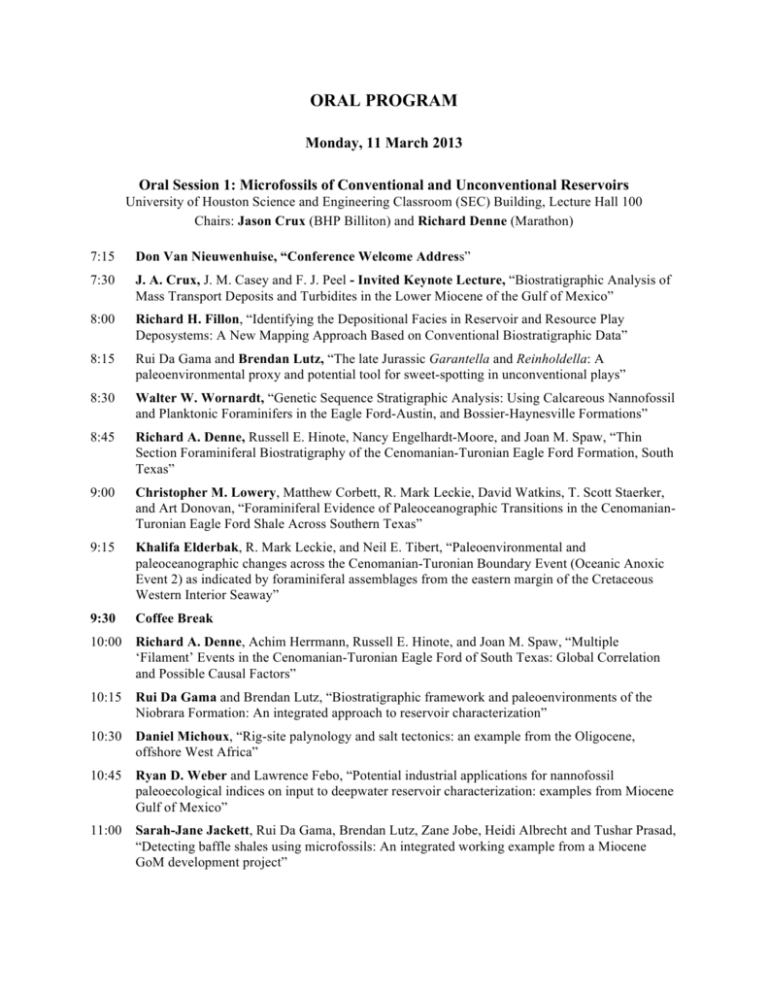
ORAL PROGRAM Monday, 11 March 2013 Oral Session 1: Microfossils of Conventional and Unconventional Reservoirs University of Houston Science and Engineering Classroom (SEC) Building, Lecture Hall 100 Chairs: Jason Crux (BHP Billiton) and Richard Denne (Marathon) 7:15 Don Van Nieuwenhuise, “Conference Welcome Address” 7:30 J. A. Crux, J. M. Casey and F. J. Peel - Invited Keynote Lecture, “Biostratigraphic Analysis of Mass Transport Deposits and Turbidites in the Lower Miocene of the Gulf of Mexico” 8:00 Richard H. Fillon, “Identifying the Depositional Facies in Reservoir and Resource Play Deposystems: A New Mapping Approach Based on Conventional Biostratigraphic Data” 8:15 Rui Da Gama and Brendan Lutz, “The late Jurassic Garantella and Reinholdella: A paleoenvironmental proxy and potential tool for sweet-spotting in unconventional plays” 8:30 Walter W. Wornardt, “Genetic Sequence Stratigraphic Analysis: Using Calcareous Nannofossil and Planktonic Foraminifers in the Eagle Ford-Austin, and Bossier-Haynesville Formations” 8:45 Richard A. Denne, Russell E. Hinote, Nancy Engelhardt-Moore, and Joan M. Spaw, “Thin Section Foraminiferal Biostratigraphy of the Cenomanian-Turonian Eagle Ford Formation, South Texas” 9:00 Christopher M. Lowery, Matthew Corbett, R. Mark Leckie, David Watkins, T. Scott Staerker, and Art Donovan, “Foraminiferal Evidence of Paleoceanographic Transitions in the CenomanianTuronian Eagle Ford Shale Across Southern Texas” 9:15 Khalifa Elderbak, R. Mark Leckie, and Neil E. Tibert, “Paleoenvironmental and paleoceanographic changes across the Cenomanian-Turonian Boundary Event (Oceanic Anoxic Event 2) as indicated by foraminiferal assemblages from the eastern margin of the Cretaceous Western Interior Seaway” 9:30 Coffee Break 10:00 Richard A. Denne, Achim Herrmann, Russell E. Hinote, and Joan M. Spaw, “Multiple ‘Filament’ Events in the Cenomanian-Turonian Eagle Ford of South Texas: Global Correlation and Possible Causal Factors” 10:15 Rui Da Gama and Brendan Lutz, “Biostratigraphic framework and paleoenvironments of the Niobrara Formation: An integrated approach to reservoir characterization” 10:30 Daniel Michoux, “Rig-site palynology and salt tectonics: an example from the Oligocene, offshore West Africa” 10:45 Ryan D. Weber and Lawrence Febo, “Potential industrial applications for nannofossil paleoecological indices on input to deepwater reservoir characterization: examples from Miocene Gulf of Mexico” 11:00 Sarah-Jane Jackett, Rui Da Gama, Brendan Lutz, Zane Jobe, Heidi Albrecht and Tushar Prasad, “Detecting baffle shales using microfossils: An integrated working example from a Miocene GoM development project” 11:15 Aristóteles de Moraes Rios-Netto, Daniela Santos Machado Brito, Fernanda Silva de Araújo, and Carlos Jorge Abreu, “Foraminiferal Biostratigraphy Helps Understanding of the Evolution of a Quaternary Deep-water Lobe Complex in Campos Basin Brazil” 12:00 Lunch, Conrad Hilton Ballroom – Poster Exhibit Area Oral Session 2: Reconstruction of Past Environments and Biofacies Analysis University of Houston Science and Engineering Classroom (SEC) Building, Lecture Hall 100 Chairs: Mark Leckie (University of Massachusetts) and David Watkins (University of Nebraska) 1:30 Felix M. Gradstein, I. Davydov and Øyvind Hammer, “Mid-Carboniferous cyclic sedimentation on Bear Island (Arctic Norway)” 1:45 Issam Al-Barram, Randall Penney, and Herve Farran, “Resolving correlation complexity of the Haushi Group, Oman” 2:00 Katrin Ruckwied and Annette E. Götz, “The palynological record of South Africa’s Permian coal deposits: clue to decipher Gondwana’s climate history on high time resolution” 2:15 T. Danelian, A. Zambetakis-Lekkas, G. Asatryan, and A. Grigoryan, “Reconstructing Jurassic and Cretaceous paleoenvironments in Armenia based on Radiolaria and Foraminifera; implications for the geodynamic evolution of the Tethyan realm in the Lesser Caucasus” 2:30 C. J. Schröder-Adams, A.T. Pugh, J. Andrews, J. O. Herrle, J. W. Haggart, M. Hay, D. Harwood and J.M. Galloway, “Contrasting paleoenvironments and paleoproductivity signals in the Upper Cretaceous Boreal Sea: a multi-fossil approach” 2:45 Gerson Fauth, Alessandra da Silva dos Santos, Carlos Eduardo Lucas Vieira, Cristianini Trescastro Bergue, Simone Baecker Fauth, Elizabete Pedrão Ferreira, Marta Cláudia Viviers, Javier Helenes Escamilla, and Marcelo de Araújo Carvalho, “Ostracodes, charophytes and palynomorphs integrated biostratigraphy of the Upper Cretaceous in Santos Basin, Brazil” 3:00 A. T. Pugh, C. J. Schröder-Adams, E. S. Carter, J. O. Herrle, J. W. Haggart, and J. M. Galloway, “Upper Cretaceous Radiolarian Assemblages and Paleoenvironments of the Sverdrup Basin, Ellef Ringnes Island, Nunuvut, Canada” 3:15 Coffee Break 3:45 T. Markham Puckett, “Ostracodes and Plate Tectonics: A Case from the latest Cretaceous of the Caribbean Region” 4:00 Pankaj Khanna and Pramod Kumar, “Characterization of Shell Concentration and Taphonomic Analysis of Maniyara Fort Formation in Kutch Basin, India” 4:15 J. Daneshian and L. Ramezani Dana, “Foraminifera of the Qom Formation as Paleoenviromental indicators in north of Central Iran basin” 4:30 Marie-Pierre Aubry, Don Van Nieuwenhuise, William A. Berggren, Myriam E. Katz, and Kenneth G. Miller, “Neogene Allostratigraphy and Benthic Foraminiferal Biofacies in the Northern Gulf of Mexico along a Depth Transect” 4:45 Nicholas Holmes, Patel Balwant, Nadine Bedayse, Mike Curtis, Roger Kimber, Tim Needham, and Andrew Thurlow, “The role of foraminiferal biofacies in developing a geologically integrated stratigraphic framework for the North Coast Marine area, Trinidad & Tobago” 5:00 Martin Gross, Werner E. Piller, and Marco Caporaletti, “The ostracod genus Cyprideis (Crustacea) and its implication for Western Amazonia’s palaeoenvironments (Late Miocene; Solimões Formation; Brazil)” 5:15 Ryan Verbanaz and Scott E. Ishman, “Paleoceanographic and paleoglacial reconstruction of Barilari Bay, western Antarctic Peninsula from the benthic foraminiferal record” 5:30 Social Hour and Poster Sessions Tuesday, 12 March Oral Session 3: High Resolution Biostratigraphy, Taxonomy, and Evolution University of Houston Science and Engineering Classroom (SEC) Building, Lecture Hall 100 Chairs: Anthony Gary (EGI, University of Utah) and Alicia Kahn (Chevron) 7:30 Bridget S. Wade - Invited Keynote Lecture, “The time has come: Advances in Cenozoic tropical planktonic foraminiferal biochronology” 8:00 Isabella Raffi, Jan Backman, Domenico Rio, Claudia Agnini, Eliana Fornaciari, and Heiko Pälike, “Biozonation and biochronology of Cenozoic calcareous nannofossils from low and middle latitudes” 8:15 Marie-Pierre Aubry and David Bord, “Back to Basics: Coccolithophores Taxonomy and phylogenetic reconstruction” 8:30 David Bord and Marie-Pierre Aubry, “Morphometric analysis on the Tribrachiatus Lineage: Quantifying morphologic variability during speciation” 8:45 Osman Varol, “New structural observations within Coccolithus, Clausicoccus, Toweius, Prinsius and Reticulofenestra” 9:00 Amy Taylor and Zach Ollerton, “A global perspective on local biostratigraphy: an example from the Scotian Shelf” 9:15 Mike Bidgood and Monika Dlubak, “Large Paleontological Data Sets and the Early History of the South Atlantic” 9:30 Coffee Break 10:00 Paul N. Pearson and Eleanor H. John, “Greenhouse climates, pelagic ecosystems, oxygen minimum zones, and the metabolic hypothesis” 10:15 Maria Rose Petrizzo, Francesca Falzoni, and Brian T. Huber, “Progress in the accuracy and resolution of the Late Cretaceous planktonic foraminiferal biozonation: diversification of Dicarinella and Marginotruncana and biostratigraphic implications” 10:30 Francesca Falzoni, Maria Rose Petrizzo, Brian T. Huber, and Kenneth G. MacLeod, “Santonian–Campanian (Late Cretaceous) planktonic foraminiferal turnover, depth ecology and paleoceanographic implications” 10:45 Shari L. Hilding-Kronforst and Bridget S. Wade, “Revising middle Eocene planktonic foraminiferal bioevents – integrating bio-magneto-chronology” 11:00 R. Mark Leckie, Lyndsey Fox, Andrew Fraass, Richard Olsson, Paul Pearson, Isabella Premoli Silva, Silvia Spezzaferri, and Bridget Wade, “Status and Phylogeny of Paragloborotalia during the Oligocene to early Miocene” 11:15 Mostafa M. Hamad, “Planktonic foraminiferal biostratigraphy and paleoecology of the Miocene sequence in the area between Wadi Gharandal and Bir Haleifiya, Gulf of Suez region, Egypt” 12:00 Lunch and Poster Sessions Oral Session 4: Environmental Monitoring and New Techniques and Technologies University of Houston Science and Engineering Classroom (SEC) Building, Lecture Hall 100 Chairs: Thomas Demchuk (ConocoPhillips) and Iain Prince (Shell) 1:30 Nicolas Barbarin, Luc Beaufort, Yves Gally, and Jean-Marc Moron, “Automated recognition system of Cenozoïc calcareous nannofossils” 1:45 Gunilla Gard and Anthony Gary, “Automated Fossil Analysis – Advances in Technology Allow for a Paradigm Shift in Biostratigraphic Data Collection and Analysis” 2:00 Andrew J. Fraass, Serena Dameron, Jonathan Dameron, Christopher Lowery, Stephen A. Nathan, and R. Mark Leckie, “FACTbase: A new solution for foram identification” 2:15 A. C. Gary, E. Yu, and G.W. Johnson, “A Web-based Paleoecological Database for Microfossils” 2:30 David H. McNeil, Emily Matys, and Tanja Bosak, “Raman spectroscopic indicators of thermal maturation and graphitization of organic cement in fossil agglutinated foraminifera” 2:45 Christopher James Duffield and Elisabeth Alve, “Feeding habits of deep water benthic foraminifera: An experiment with propagules” 3:00 Kenneth L. Finger, “Benthic foraminifers as paleodepth indicators in the Miocene of Chile: a review of the traditional method and conflicting interpretations” 3:15 Coffee Break 3:45 Malcolm B. Hart and Christopher W. Smart, “Test deformation in foraminifera: variable impacts caused by metal contamination and/or lowered pH in estuarine and marine environments” 4:00 Ali T. Haidar, “Time resolution and trace detection when a distinction between vertical deposition and lateral transport is not possible in the stratigraphic record” 4:15 Lawerence Febo, “Integrated biostratigraphy in shallow geological hazard assessments” 4:30 J. O. Herrle, C. Gebühr, J. Bollmann, A. Giesenberg, and P. Kranzdorf, “Reconstructing Holocene salinity changes in the Aegean Sea using morphological variations of Emiliania huxleyi-coccoliths” 4:45 Sumedh K. Humane, Thierry Adatte, Samaya S. Humane, and Nandeshwar Borkar, “Diatoms and Geochemical Records of anthropogenic impacts in sediments of the Tarna-Satighat Lake, Umrer Taluka, Nagpur District, Maharashtra, India: Implications as indicator of trophic status and land-use change” 5:00 Flavia Fiorini and Stephen W. Lokier, “Changes in benthic foraminifera and sedimentary facies distribution of the Abu Dhabi (UAE) coastline over the last 50 years” 5:15 R. D. Lewis, H. R. Tichenor, O. C. Turner, and J. L. Morgan, “The use of taphonomic grade and biovolume data to supplement relative abundance: Benthic foraminifera from San Salvador, Bahamas” 5:30 Social Hour and Poster Session Wednesday, 13 March Oral Session 5: Microfossils in Paleoclimatology and Paleoceanography University of Houston Science and Engineering Classroom (SEC) Building, Lecture Hall 100 Chairs: Gunilla Gard (BHP Billiton) and Lawrence Febo (BP America) 7:30 Benjamin Horton - Invited Keynote Lecture, “Microfossils in tidal settings as indicators of sea-level change, paleoearthquakes, tsunamis and tropical cyclones” 8:00 Martine Boswell, Ben Horton, Steve Culver, Andrew Kemp, Daria Nikitina, Jessica Pilarczyk, and Chris Vane, “Benthic foraminifera from the White Sea, Russia and their implications for high resolution sea-level studies” 8:15 M. A. Godoi, P. L. Gibbard, and M. A. Kaminski, “Correlating shallow marine Holocene records across the Strait of Magellan (53°S), Chile” 8:30 Crystal Pletka and Laurel S. Collins, “Diversity of Caribbean benthic foraminiferal assemblages through the closure of the Central American Seaway” 8:45 Lyndsey Fox, Bridget Wade, Ann Holbourn, and Melanie Leng, “20,000 Forams under the Sea: Reconstructing Climate Variability in the Middle Miocene using Planktonic Foraminifera from the Equatorial Pacific Ocean (IODP Site U1338)” 9:00 Christopher M. Lowery, Emily Browning, R. Mark Leckie, and Cedric M. John, “Foraminifera as Proxies for Miocene Sea Level Change and Sequence Boundaries: Observations from the Marion Plateau, ODP Leg 194” 9:15 Patrick Grunert, Werner E. Piller, and Mathias Harzhauser, “Benthic foraminiferal assemblages reveal the history of the Burdigalian Seaway” 9:30 Coffee Break 10:00 Werner E. Piller, Markus Reuter, Marco Brandano, and Mathias Harzhauser, “Correlating Mediterranean shallow water deposits with global Oligocene–Miocene stratigraphy and oceanic events” 10:15 A. J. P. Houben, S. M. Bohaty, A. Sluijs, and H. Brinkhuis, “Organic-walled dinoflagellate cysts as tracers of oceanographic reorganization in the Southern Ocean before the onset of full-scale Antarctic glaciation” 10:30 Peter K. Bijl, Alexander J. P. Houben, Jörg Pross, Appy Sluijs, Paolo Stocchi, B. L. A. Vermeersen and Henk Brinkhuis, “Relative sea level changes of the Paleogene Southern Ocean inferred from organic-walled dinocysts: a synthesis from ODP Leg 189, Tasmania, Australia” 10:45 Lizette Leon-Rodriguez, Gerald R. Dickens, and R. Mark Leckie, “Carbonate and planktic foraminiferal accumulation in the early Paleogene: The record at ODP Site 1215, eastern equatorial Pacific Ocean” 11:00 Richard H. Fluegeman and Michele A. Chezem, “Foraminiferal paleoecology across the earlymiddle Eocene transition (EMET) in the western Caribbean” 11:15 Kendra R. Clark, Serena Dameron, and R. Mark Leckie, “Diachroneity and dissolution in the Maastrichtian of Shatsky Rise, NW Pacific” 12:00 End of Oral Sessions ORAL PROGRAM PLAN SEC Building Room 100 PLEASE NOTE THIS PLAN IS AS OF MARCH 1, 2013 AND IS SUBJECT TO CHANGE.
